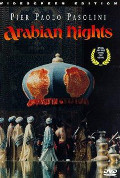
Italy/France 1974
Directed by
Pier Paolo Pasolini
155 minutes
Rated R
Reviewed by
Bernard Hemingway

Arabian Nights
Arabian Nights, the third film in Pasolini’s “Trilogy of Life” following The Decameron, 1971, and The Canterbury Tales, 1972, won a Grand Prix Spécial Prix at the 1974 Cannes Film Festival (the Grand Prix went to Coppola’s The Conversation). Whilst following the famous text’s approach of continuously inventing new narrative lines there are none of typical Aladdin or Ali Baba stories but rather a loosely related selection of tales centred on the main story of Nur-e-Din (Franco Merli), who comes to fall in love with a slave girl, Zumurrud (Ines Pellegrini). The location photography in Ethiopia, Yemen, Iran and Nepal is often stunning (although the same cannot be said for the lame SFX).Whilst with The Canterbury Tales (1971) Pasolini bent the original text into a generalized manifesto on the disruptiveness of sex, here he subjects it more to his own sexual proclivities. As a homosexual with a taste for street boys this results in a (literal and metaphorical) over-exposure of naked young men with close ups of their wedding tackle (the girls are more coyly treated). The appeal of this depends no doubt on the audience but most of Pasolini’s cast were non-actors and at 155m the endless close-ups of gormless young men, particularly Pasolini’s young Sicilian “find”, Franco Merli, who clearly have not the vaguest understanding of what they are doing gets tiresome. With music by Ennio Morricone and fine cinematography by Giuseppe Ruzzolini, Arabian Nights is the most visually sophisticated of the trilogy but is still a film that requires a good deal of indulgence.
DVD Extras: Alternative English language version; Original trailer; Deleted scenes
Available from: Shock Entertainment
Want something different?





